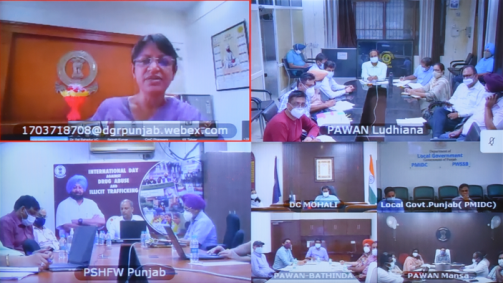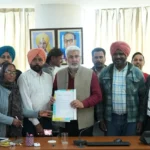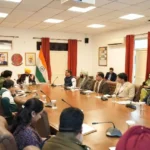CHANDIGARH, AUGUST 11: The Chief Secretary, Ms. Vini Mahajan, directed the departments concerned to step up RT-PCR testing and to conduct at least 10,000 RT-PCR tests related to schools daily and the DCs to ensure that only fully vaccinated teaching and non-teaching staff was allowed to attend the schools.
She directed that target of 40,000 samples per day must be achieved and testing shall be further increased if the Covid cases rise.
Chairing a meeting to review the Covid situation in the state with the senior officials of the Health, Medical Education, School Education departments and all Deputy Commissioners, the Chief Secretary expressed concern over the movement of people to Punjab from neighboring states, where the virus cases were once again on the rise, and asked the officials concerned to keep a close watch on the positivity rate ahead of the festival season when extra vigil was required to prevent the surge of a virus.
Instructing all the districts to continue aggressive testing and contact tracing and testing to check the spread of the pandemic, she said epidemiologists have been appointed in all the districts and all-out efforts should be made to thwart the possible third Covid wave.
Quoting the forecast from the University of Cambridge, Ms. Mahajan said going with the forecast, new cases can be expected to double in about 64 days (under the assumption that the growth rate remains constant).
She expressed satisfaction over the fact that 2,45,823 samples have been taken in the past week from August 3 to 9, and only 352 had tested positive, which accounted for a positivity rate of 0.1 percent.
Stressing the need to further ramp up the existing health infrastructure in the state, the Chief Secretary desired that each district should aim to augment bed capacity by 25 percent from the second wave’s peak demand.
She was apprised that at present, 4,307 level-2 beds were available in the government hospitals, which would be increased to 5,387 after adding 25 percent capacity, while 6,565 level-2 beds were existing in private facilities, where 1,644 more beds would be added to increase the capacity by 25 percent.
Asking the officials to focus on further increasing medical oxygen availability in the government and private hospitals, the Chief Secretary directed to make operational all PSA plants within this month, besides further augmenting oxygen concentrator capacity to meet the demand for life-saving gas in future.
Covid Control Room Incharge, Ajoy Sharma (IAS), apprised the Chief Secretary that five new modules have been added in COVA app in order to manage the Covid data more effectively and reduce the data duplication. Sample collection centre application has been added to facilitate data uploading and updating on the app, all laboratories will have an interface on COVA portal to update and upload the results of RT-PCR, TrueNAT, CBNAAT on the app, and the COVA platform will push this data to Centre through the backend integration with ICMR, he divulged.
Besides, the rapid response teams (RRTs) will visit the home isolated patients to collect their vitals and report their health parameters on the COVA app, he informed, while adding that the hospitals will log in on COVA portal and update the status of patients admitted in their hospitals, which will also have to report the status of beds with the bifurcation of L2 and L3 beds in their institutions on a daily basis, besides informing about the number of Covid patients on oxygen support, without oxygen support, suspected Covid patients on oxygen and without oxygen support.
Moreover, the data management has been updated with the provision that the district data cells or RRTs can update the information in case it was not captured during sampling or needs to be updated at a later stage.
Principal Secretary Health and Medical Education Alok Shekhar, Health Adviser Dr. KK Talwar, BFUHS Vice-Chancellor Dr. Raj Bahadur, and Secretary School Education Krishan Kumar attended the meeting among other officials.










